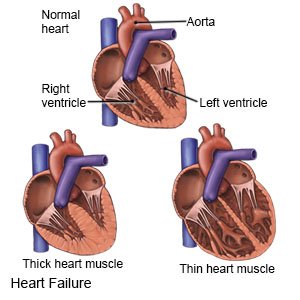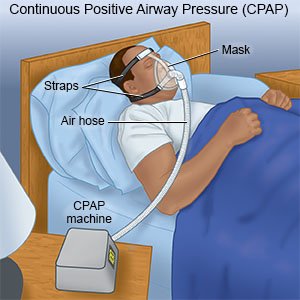Heart Failure
Medically reviewed by Drugs.com. Last updated on Aug 4, 2025.
Heart failure is a condition that does not allow your heart to fill or pump properly. Not enough oxygen in your blood gets to your organs and tissues. Fluid may not move through your body properly. Fluid may build up and cause swelling and trouble breathing. This is known as congestive heart failure. Heart failure may start in the left or right ventricle. Heart failure is often caused by damage or injury to your heart. The damage may be caused by other heart problems, diabetes, or high blood pressure. The damage may have also been caused by an infection. Heart failure is a long-term condition that tends to get worse over time. It is important to manage your health to improve your quality of life.
 |
WHILE YOU ARE HERE:
Informed consent
is a legal document that explains the tests, treatments, or procedures that you may need. Informed consent means you understand what will be done and can make decisions about what you want. You give your permission when you sign the consent form. You can have someone sign this form for you if you are not able to sign it. You have the right to understand your medical care in words you know. Before you sign the consent form, understand the risks and benefits of what will be done. Make sure all your questions are answered.
Medicines:
Medicines may be given to help regulate your heart rhythm and lower your blood pressure. You may also need medicines to help decrease extra fluids. Medicines, such as NSAIDs, may be stopped if they are causing your heart failure to become worse.
Related medications
Tests:
- Blood tests are used to check for heart problems such as coronary artery disease or decreased blood flow. Blood tests also give healthcare providers information about your kidney, liver, and thyroid function. The results can also show an infection.
- Echocardiogram is a type of ultrasound. Sound waves are used to show the structure and function of your heart. This test may show if there are problems with your heart valves. It may also show if the chambers of your heart are working properly.
- X-ray, CT, or MRI pictures may be taken of your heart and lungs. The pictures may show the cause of your heart failure, or blood clots or fluid in your lungs. You may be given contrast liquid to help your heart show up better in the pictures. Tell the healthcare provider if you have ever had an allergic reaction to contrast liquid. Do not enter the MRI room with anything metal. Metal can cause serious injury. Tell the provider if you have any metal in or on your body.
- Daily weight checks will be done. Healthcare providers will compare your weight from day to day to check how much body fluid you have. Rapid weight gain can be a sign of fluid buildup. This may mean your heart failure is worsening.
Treatment:
- Oxygen may help you breathe easier if your oxygen level is lower than normal. A CPAP may be used to keep your airway open while you sleep.

- Surgery can be done to implant a pacemaker or another device in your chest to regulate your heart rhythm. Other types of surgery can open blocked heart vessels, replace a damaged heart valve, or remove scar tissue.
Treatment options
The following list of medications are related to or used in the treatment of this condition.
RISKS:
Heart failure can be life-threatening. It can cause fluid in your lungs. Heart failure can damage your heart so that it no longer pumps.
CARE AGREEMENT:
You have the right to help plan your care. Learn about your health condition and how it may be treated. Discuss treatment options with your healthcare providers to decide what care you want to receive. You always have the right to refuse treatment.© Copyright Merative 2025 Information is for End User's use only and may not be sold, redistributed or otherwise used for commercial purposes.
The above information is an educational aid only. It is not intended as medical advice for individual conditions or treatments. Talk to your doctor, nurse or pharmacist before following any medical regimen to see if it is safe and effective for you.
Learn more about Heart Failure
Treatment options
Care guides
Symptoms and treatments
Medicine.com guides (external)
Further information
Always consult your healthcare provider to ensure the information displayed on this page applies to your personal circumstances.
